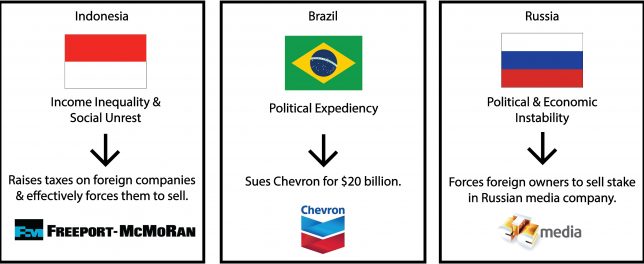Investing in a foreign country is often akin to investing in non-voting B Shares of common stock or Subordinated Debt. While such investments will allow you to share in a country’s success, it also means that you may share disproportionately in the country’s woes.
Foreign investors are particularly vulnerable to “economic persecution” during periods of political or economic hardship. When a country or political party becomes concerned about self-preservation, foreign investors, who are not part of their “shared identity”, become easy targets for their ire.
The following are three examples where foreign investors were treated as a subordinated class. From them, we can extract some valuable lessons.
Indonesia: Raise taxes on foreign corporations and ultimately force them to sell.
Indonesia has been targeting foreign copper mining corporations with higher taxes and increased pressure to sell their Indonesian assets to domestic investors.
“As part of its push to earn more from the mining sector, Indonesia banned ore exports and placed restrictions on exports of mineral concentrates in 2014 to push companies to invest in domestic smelting.” (link)
“Indonesia has asserted more control over foreign investment with the aim of redistributing economic benefits in a more equitable manner, an effort that began after the fall of dictator Suharto.”
“It said the divestment obligation was meant to “facilitate” mining companies to join with the government and “bring justice” for the people of Indonesia as the “absolute” owners of the country’s resource wealth.”
“Freeport derives roughly one-third of its copper output from Indonesia.”
Reasons for “Economic Persecution”:
- Slowing GDP Growth
- “Southeast Asia’s biggest economy has been undershooting the 7 percent growth target set by Widodo when he took office two years ago, mainly due to low commodity prices and weaker global demand.” (link)
- Rising Income Inequality
- “Inequality in Indonesia is climbing faster than in most of its East Asian neighbors, raising the concerns of many Indonesians,” (link)
- “The country’s official poverty rate has halved between 1999 and 2012, falling from 24% to 12%. However, the Gini coefficient, a measure of national consumption inequality, has increased from 0.32 in 1999 to 0.41 in 2012[1]. Hence income distribution has become much more unequal.” (link)
Brazil: Sue the heck out of foreign corporations.
Brazilian prosecutors were surprisingly aggressive towards Chevron after an oil spill in 2011. They sought $20 billion in damages and filed criminal charges against the executives. Meanwhile, State owned oil company Petroleo Brasileiro which owned 30% of Chevron’s well, was not sued by the Brazilian government. (link)
“But Brazil remains a politically challenging place to operate, with complex environmental licensing procedures and requirements that a lot of equipment and labor be made and hired locally.”…”Oil companies were rattled in 2011 when a minor oil spill by Chevron prompted Brazilian prosecutors to seek nearly $20 billion in damages and file criminal charges against executives. The charges were ultimately dropped, and Chevron agreed to pay $42 million to settle the suits in 2013.” (link)
Reasons for “Economic Persecution”:
- Politically Expedient: A headline catching $20 billion lawsuit will direct the country’s attention and blame towards Chevron, and away from politicians and regulators. Furthermore, it may help advance political careers or party agendas.
- Socially Acceptable: A foreign company is an easy and socially acceptable target.
Russia: Force foreign investors to sell.
In 2015, Russia passed a law limiting foreign ownership of Russian media companies to 20%. There was really only one company affected by this law, CTC Media, whose stock price subsequently crashed. Before the announcement, CTCM had attracted many value investors who were enamored with its strong financials and compelling valuation. (link)
What good is it to own a foreign company if you’re forced to “sell low” every time things get bad in that country?
Reasons for “Economic Persecution”:
- Political and Economic Tension: 2014 Russian military intervention in Ukraine, subsequent capital flights, and negative GDP growth due to collapsing oil prices. (link)
- The Ruling Political party felt threatened: Foreign ownership in Russian media companies could undermine the ruling political party’s agenda and power, especially during an unstable period.
Tombstones
The financial industry uses “tombstones” to announce particular transactions. Perhaps we should use tombstones to announce economic mistreatment of foreign investors. Using the examples above, I imagine they’d look something like this:
Investment Lessons
Be aware that governments can often turn on foreign companies or investors when it suits them. Before investing in a foreign country, ask yourself:
- What percentage of this company’s revenue and profits come from this country?
- How critical is this company’s relationship with this country?
- Does this company, in any way, undermine the agenda or power of the ruling political party?
- Political parties may tolerate minor political subversion when things are stable. But under uncertain political conditions, politicians may act swiftly and harshly against any foreign investors seen as a threat to power.
- Is the country’s economy slowing down?
- A country with high growth will have less animosity towards foreign investors than one with slowing growth.
- Is Income Inequality becoming an issue?
- Increasing income inequality creates a hostile political environment for foreign investors. They are the easiest and least controversial of targets.
- Are there heightened international tensions with this country?
- Does this country have a strong history of protecting foreign investors?
- i.e. Does the ruling political party have the autonomy to quickly and effectively subvert the rights of foreign investors?
Discover more from Latticework Investing
Subscribe to get the latest posts sent to your email.


Hi Richard,
Loved this article. And coming from investment banking industry, I especially liked your tombstones. Keep it up.
Ashish
Hi Ashish, I’m glad you did! Thanks for your great feedback! Best, Richard